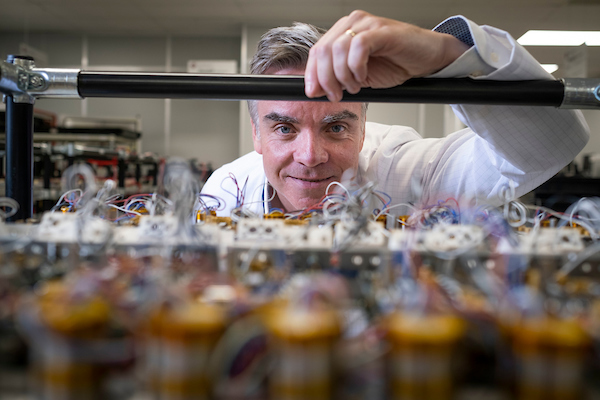Last year was one of unprecedented change in all aspects of life. The Covid-19 pandemic and the complexities of Brexit have reshaped the way we do business in a very short amount of time. As a consequence, our own manufacturing industry has seen significant and dramatic change.
From the early 90s onwards, the formation of the ‘global supply chain’ initiated a progressive shift in the global manufacturing base from developed areas like Western Europe and the US, to lower cost regions such as China, South East Asia and Eastern Europe. As the world became more digitally connected, the pace of this shift quickened and seemed irreversible.
However, turbulent geopolitics and increasing nationalism, combined with the challenges of a global pandemic, have called into question the risk/benefit balance of globalisation. Almost overnight, the dynamics around costs and delivery (the key pillars of the global supply chain) were called into question - and sometimes the answers were not comfortable.
Whilst the age of the global supply chain is clearly not over, OEMs are having to broaden their considerations with regards to how they handle existing business, as well as the approach they take to setting up new projects. As a result, discussions around on-shoring and localisation are becoming more common.
In order to capitalise on this changing dynamic, countries like Scotland will need to demonstrate that they have the skills, capabilities and ambition to innovate and compete. If they are able to capitalise on this trend, then a number of new and exciting opportunities lie ahead for local small to medium manufacturing companies.
But what are these new opportunities, and what does this mean, in particular, for Original Equipment Manufacturers (OEMs) and Electronics Manufacturing Services (EMS) companies?
Support local
Support for local businesses is one of the biggest shifts in consumer behaviour we have seen during the pandemic. The ethical shopper is now mainstream, and this is influencing how businesses choose to design and make their products.
This has a direct impact on the supply chain. Many consumers prefer buying products made in their own country. By working with local partners, businesses can appeal to considered shoppers while having confidence that they are supporting the local economy and taking pride in producing quality, British-made products.
It can be quicker and smoother to use a local manufacturer as there are no conflicting time zones and delivery time can be significantly reduced, which could secure more customers in the long term by allowing local companies to meet growing demand. This would also allow businesses to build in the flexibility to make changes without the increasing risks associated with the global supply chain.
What does this mean for OEMs?
Globalisation clearly delivered strong benefits to both end customers and OEMs. Ever decreasing costs combined with an apparently seamless supply chain created the near utopian scenario whereby the consumer was continually offered lower prices whilst the OEMs simultaneously improved their margins.
However, even pre-pandemic, there were already a number of growing concerns related to the stability and sustainability of the global supply chain. Prices had ‘bottomed out’ (and were even rising), delivery times were inconsistent, and there were growing concerns regarding the health and wellbeing of workers on both sides of the global supply chain. Over the last year the global pandemic has not only heightened these concerns, but it has also introduced new ones.
For OEMs, this introduces a range of questions around whether they should be sourcing products closer to home and, more importantly, whether this can be done without compromising on quality, price or delivery.
Is the utilisation of the global supply chain the goal in itself (regardless of risks) or are there other mitigating factors that now need to be taken into consideration? Does the scorecard of price, quality and delivery stay the same, pre and post pandemic, or has the risk and opportunity profile now changed?
This is an area where engagement with progressive EMS companies can not only remove risk, but lead to surprisingly positive results when the appropriate quality, cost and delivery comparisons are carried out.
The future of EMS
As with OEMs, EMS companies must find creative solutions to tackle these macro-level challenges while positioning themselves to support the needs of OEMs.
The weakening of globalisation will create opportunities for progressive EMS companies to capitalise as OEMs look to de-risk their supply chains and localise some (or all) of their manufacturing needs. Progressive companies will already be positioning themselves to demonstrate to OEMs that they have the required capacity, capability, cost competitiveness and structure to support their requirements.
The close alignment of cultures, geography and goals should enable local partnerships to be established between OEMs and EMS companies with a dual focus on successfully addressing the immediate business challenges and implementing a roadmap focused on the creation of a sustainable, collaborative relationship able to successfully work through the range of business challenges. For sustainable success, localisation needs to be looked at as a long term partnership and not just a band aid for short term problems.
Driving EMS forward
For local EMS companies to be seen as an attractive partner, they need to take a two-pronged approach in working with OEMs. Step 1 is supporting OEMs through their current business challenges brought on by the breakdown in global supply chains. Step 2 is supporting existing and new OEMs (start-ups/early stage companies) in developing and successfully bringing to market new products through local partnerships.
To do this, established EMS companies must showcase their existing capacity and capabilities and also demonstrate the necessary ambition to align, develop and adapt to the changing demands. A business model and mindset focused on flexibility and responsiveness would be a strong differentiator versus some of the rigid and slow elements attributed to the global supply chain model.
CB Technology is a company built on these principles and we pride ourselves on the partnerships we have established with our customers. As a contract manufacturer, our focus is on ‘flexing and tailoring’ our approach to ensure we provide our customers with the exact service and solutions they require to optimise their businesses. We do not dictate solutions. Instead, we listen to our customers, then draw on our depth of experience to tailor the solutions we offer each and every one.
We have long-term strategic partnerships with OEMs across a range of sectors including Energy, Industrial, Communications and Medical, supporting their core business activities whilst in parallel supporting the development and introduction of new products by both existing and new customers.
Looking to Scotland
The manufacturing sector remains a vital part of Scotland’s economy and will play a key role in economic recovery following the pandemic. The country is already in a strong position, having made significant investment in the sector, and we expect to see this continue in coming years.
Scotland is also home to a number of vibrant sectors which will drive economic growth and require the support of a strong manufacturing sector over the coming years. The space industry is seeing unprecedented growth and Scotland is the headquarters for over 80 of the leading space companies. Rising faster than anywhere else in the UK, the value of this sector in Scotland is expected to be more than £4 billion by 2030.
The Censis Innovation Centre for Sensing, Imaging and IoT technologies, located at Glasgow University, has stimulated a wave of start-ups and technology breakthroughs in this sector, and CB Technology is very pleased to have partnered with a number of companies that have successfully brought products to market. The circular nature of these developments combined with the innovation hubs at a number of Scottish universities will ensure that this sector will continue to flourish in the coming years.
CB Technology, along with other progressive EMS companies, is well placed to support these thriving industries by aligning, engaging and supporting in the early stages for success in the long run.
The changing dynamics of globalisation are presenting both OEMs and manufacturing companies with a range of new challenges. CB Technology, alongside other progressive EMS companies, is perfectly placed to support OEMs as they navigate these challenges and set up new models and approaches to deal with the challenges ahead.
Please feel free to get in touch if you would like to discuss this topic further.


